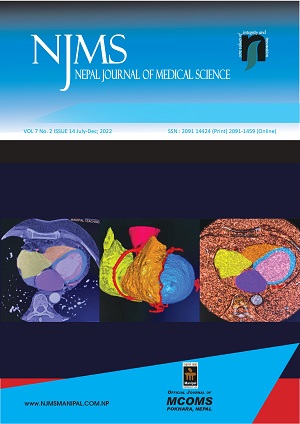Correlation of Maternal Serum Uric Acid Level and Feto-maternal Outcome in Hypertensive Disorder of Pregnancy: A Prospective Study
DOI:
https://doi.org/10.3126/njms.v7i2.47207Keywords:
HELLP Syndrome, Hypertension, Pregnancy-Induced, Uric AcidAbstract
Introduction: Hypertensive disorder of pregnancy complicates around 5-10% of all pregnancies. Hyperuricemia is one of the common findings in pre-eclampsia. The uric acid level in pre-eclamptic women is increased before the onset of hypertension and proteinuria. The increase in serum uric acid is associated with an increased risk of adverse fetal outcomes like IUGR, prematurity, IUFD and increased severity of maternal hypertensive disorders like pre-eclampsia, severe pre-eclampsia, and eclampsia and HELLP syndrome.
Methods: This was an observational, prospective cross-sectional study. One hundred and twenty women fulfilling the inclusion criteria were included in the study. Maternal uric acid was grouped into two groups i) <5.5mg/dl and ii) ≥ 5.5 mg/dl. A Pearson’s Chi-Squared test was carried out to assess whether maternal serum uric acid level and maternal and fetal complications were related.
Results: A total of 120 women fulfilling the inclusion criteria were included in the study. Seventy-six women (63.3%) had serum uric acid levels <5.5mg/dl and forty-four (36.7%) women had serum uric acid levels≥ 5.5 mg/dl. In women with serum uric acid levels of 5.5 mg/dl and more, 21 fetuses with complications like IUFD, IUGR, prematurity and those whose serum uric acid level was less than 5.5 mg/dl, 16 fetuses had complications. There was a significant association between maternal serum uric acid levels and maternal complications like pre-eclampsia, severe pre-eclampsia, eclampsia and HELLP syndrome (p=0.004).
Conclusion: Raised serum uric acid is associated with an increased risk of the feto-maternal outcome.
Downloads
Downloads
Published
How to Cite
Issue
Section
License
Copyright (c) 2022 Nepal Journal of Medical Sciences

This work is licensed under a Creative Commons Attribution 4.0 International License.
Copyright © by Nepal Journal of Medical Sciences. The ideas and opinions expressed by authors of articles summarized, quoted, or published in full text in this Journal represents only opinions of authors and do not necessarily reflect the official policy of Nepal Journal of Medical Sciences or the institute with which the author(s) is (are) affiliated, unless so specified.




